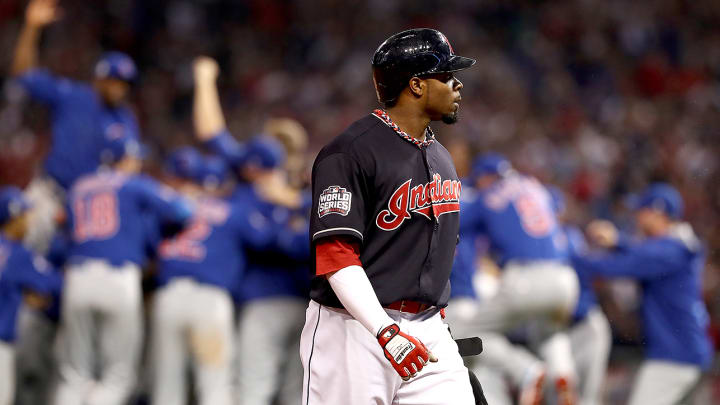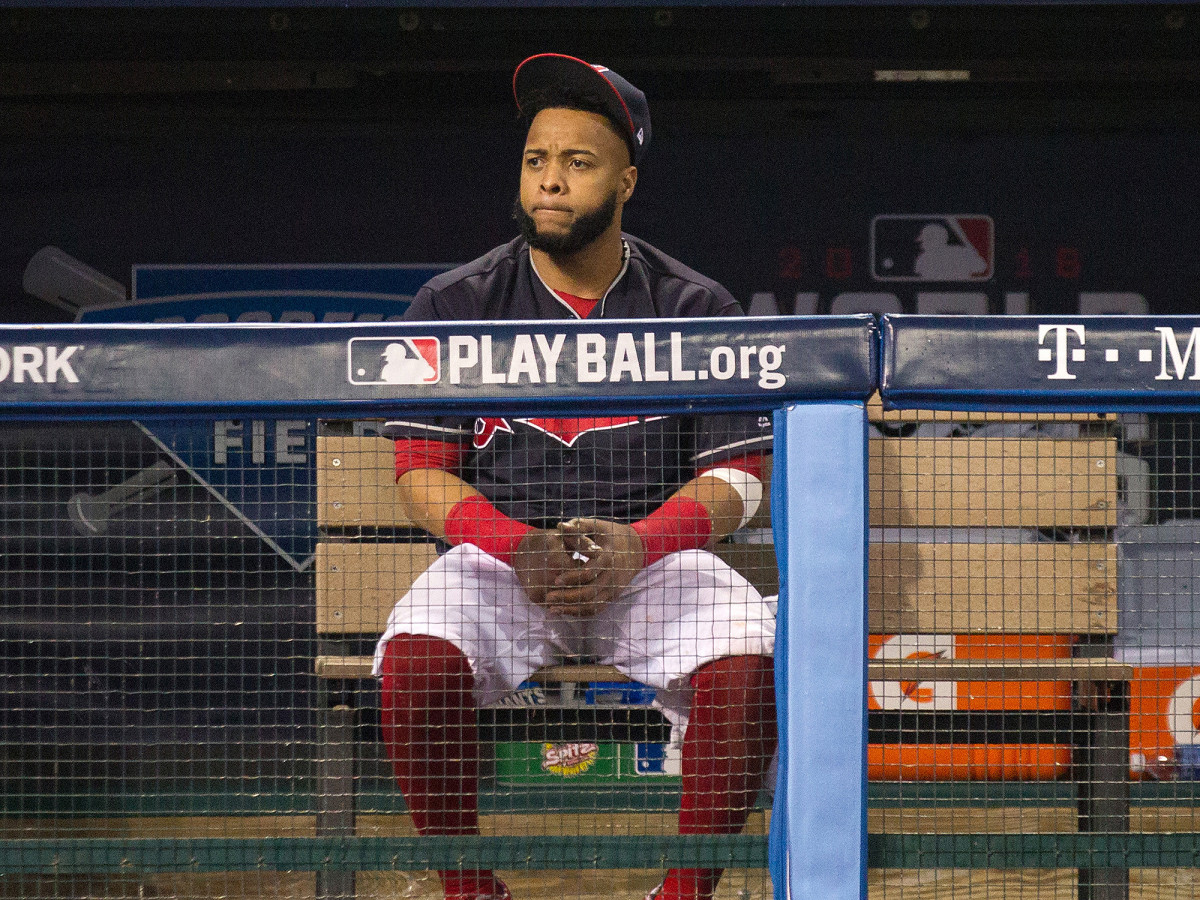Indians’ title hopes dashed as their magic runs out in Game 7 loss

CLEVELAND—They barely recognized each other after the game. They couldn’t tell whether it had been minutes or hours. They could hardly form words.
Game 7 of the World Series was exhilarating, crushing, dreamlike, stunning. It took 10 innings and four and a half hours and 343 pitches and 15 runs and a rain delay and at least a year off the life of everyone who participated. It was the worst moment of their existences … and then the most wonderful … and then even more awful than it had been…and then miraculous … and then, finally, more painful than they could have imagined.
But at least it was worthy of them.
It was “an honor to be in a game like that,” Indians manager Terry Francona said after it was all over and the Cubs had won 8–7 to leave Cleveland as the longest-suffering fan base in the sport. “They tried until there was nothing left.”
Curses and comebacks: Cubs buck deep-rooted history to win elusive title
For a team that won 11 regular-season games on walkoffs, 37 on comebacks and 49 when leading or tied at home after the eighth inning, it would have seemed wrong for this final contest to finish as a blowout. It couldn’t be that easy for either of them, Chicago with its trophy case bare since 1908 or Cleveland since 1948. So when Corey Kluber, starting for the third time in nine days and looking mortal for the first time in three years, faltered; when fireman Andrew Miller allowed his second run in October; when the Cubs took a 5–1 lead into the fifth inning; the Indians started to wonder if this could really be how it ended.
“I’m not [68] years old,” shortstop Francisco Lindor had said before Game 3, but the Indians fans at Progressive Field on Wednesday, drowned out at times by the Chicagoans who had flown in to watch history, surely felt every minute of the drought. They did not so much emit cheers and boos as moans of pain and moans of slightly different pain.
• The Cubs are champions at last, and now there's only one thing to do
Then DH Carlos Santana turned an 0–2 count into a walk. Second baseman Jason Kipnis reached on a swinging bunt that Cubs catcher David Ross, playing in the final game of his career, threw past first base. Game 5 starter Jon Lester, who had all but begged the day before to be excused from bullpen duty but nonetheless came in after the walk to Santana, threw a curveball in the dirt. Suddenly it was 5–3 and the Cleveland dugout started chirping.
*****
Rajai Davis had woken up on the morning of Oct. 30 ready to rejoice. In 10 years in the major leagues, he’d never so much as won a playoff series, so all postseason, as his Indians raced through the American League, he stood off to the side during the champagne celebrations and tried to commit the moment to memory. You never know when it’ll end, after all.
For the most part, he found it easy to keep his eyes locked on a point just a few feet ahead of him. But as the Indians took a 3–1 World Series lead, he began to wonder what it might feel like, at 36 years old and on his sixth team, to reach that brass ring. As the final out settled into someone’s glove, how would he react? He didn’t want to be the guy who falls on the ground, he decided. He wasn’t much of a jumper. He couldn’t make the glove toss look cool. So he settled on something simpler: He’d touch his fist to his chest, then shoot his hand into the air.
But then the Indians lost Game 5. And then they lost Game 6. And then they went down 3–1 in Game 7 on two balls that Davis, starting in centerfield as the team’s best defensive option, misplayed—a sacrifice fly on which he didn’t throw home immediately, followed by a double to the wall on which he first took a step in.
Champions at last: Cubs top Indians in World Series Game 7 to end title drought
And then, with the score 6–4, with two outs and one on in the bottom of the eighth inning, with the hardest-throwing man in history on the mound, Davis stepped to the plate with one thing in mind.
“I wouldn’t say I was trying for a home run,” he said afterward, “but I was definitely trying to not hit a single.”
He took two fastballs and fouled off four more before Chicago closer Aroldis Chapman tried to sneak one by at the knees. As Davis rounded the bases, as the Indians poured out of the dugout as if it were a walk-off, as fans in red and fans in blue wept, Davis touched his fist to his chest, then shot his hand into the air.
“Even when things looked so against us, it felt like there was magic in the air,” said Miller as he slowly tied his street shoes after the game. He shook his head. “Unfortunately, there wasn’t quite enough.”
*****
As the ninth inning ended, the downpour that had been threatening all night finally arrived. (Of course it did.) While Cubs rightfielder Jason Heyward was pulling his teammates into the weight room for an impassioned speech about what a 103-win squad was capable of, the Indians tried to go about their business as usual. Pitchers stayed loose in the bullpen; position players grabbed protein bars and took spins on stationary bikes.
“For a moment,” admitted second baseman Jason Kipnis, who grew up 20 miles north of Wrigley Field, “we were starting to believe in the Chicago curse ourselves.”
Play resumed 17 minutes later. In the bullpen, relievers fidgeted. In the dugout, the pitchers who had been removed from the game tried to adjust to the unsettling reality that their season was over; they could only will their teammates forward. Still, when the Cubs scored twice in the top of the 10th against Bryan Shaw, the least heralded of the Indians’ three-headed relief monster, it felt like the Indians would find a way to return the favor. And they almost did: Leftfielder Brandon Guyer worked a two-out walk in the bottom of the inning, took second and then scored on a Davis single before a Michael Martinez grounder to third gave Cleveland yet another next year to wait for. The Indians in the bullpen and on the field silently trudged across the rain-soaked dirt and grass, trying not to watch the Cubs’ dog pile at second base.

“The feeling I had was, ‘All right, this is meant to be,’” said Guyer of touching home plate with the run that cut the Cubs’ lead to 8–7. “You don’t have that feeling much in baseball. But it wasn’t meant to be, and that happens.”
It was at times a sloppy game. Davis misplayed those two balls in the fourth inning; Chicago second baseman Javier Baez rushed a throw in the first, then tried to barehand a flip in the third and instead dropped it; Ross overthrew first on that Kipnis dribbler. But for the most part, the plays that mattered came when one player simply beat another. Chapman hit his target on the fastball that Davis hit out in the eighth. So did Shaw, in the 10th; Ben Zobrist, who doubled in the go-ahead run, just guessed right.
• Timeline: An in-depth look at the Cubs’ long history
Sometimes the knowledge that your best wasn’t good enough can be more painful than a series of unforced mistakes. It’s early yet in a winter that arrived on the day—but not in the way—they’d hoped, but the Indians seem clear-eyed. They did all they could. That a team that lost its Nos. 2 and 3 starters for much of the stretch run and postseason, and its best hitter for all but 11 games, took the best club in baseball—at full strength—to the 10th inning of the final game is an achievement, even if it doesn’t feel like one. And the window has not closed: Every player other than Davis and first baseman Mike Napoli is signed through at least next year.
“We proved that we are the team we thought we were,” said Miller. “We’re disappointed in today, but everybody in here is proud of the big picture.”
As players and coaches hugged and filed out, Napoli turned to Kipnis and pointed to the hallway behind the clubhouse. “I’ve got 20 grand worth of champagne in there,” Napoli said ruefully. He headed toward the shower, leaving Kipnis sitting alone at his locker. Kipnis stood up. “We’ll put it on ice,” he said softly. “Until next year.”
